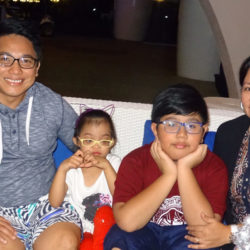“Courage,” according to the English dictionary, is a quality of spirit that enables you to face danger or pain without showing fear. How then, can we nurture our children with courage? Can we really do parenting without showing fear?
Daniel and I, plus our three children, Daphne, Rafael, and Elise, comprise our family of five. My husband and I run a ministry that requires us to travel most of the time. If bringing up your children in a normal home setting is challenging enough, having them with us on the road is doubly hard. We have to be more flexible, sensitive, and patient. Sometimes we do well, but many times we don’t. Because we know we are not perfect, we often feel guilty and scared.
Add to that various external pressures. There are always some people we know that seemingly are perfect parents. They look so well put together and their Instagram posts so idyllic that we start to feel bad about ourselves. We also have times when our shortcomings (or those of our kids) are made public. Maybe our child throws that massive tantrum in the supermarket or shares a questionable post online. Not only do these confirm that we are inadequate parents; now everybody knows.
How then do we navigate through these difficulties? Here are some things I’ve learned:
Accept your limitations. Ask for help. I am a pastor’s kid, I have a master’s degree in counseling, my husband and I are both Bible college-trained, and we serve as missionaries. But when we were faced with very difficult situations, all knowledge we have seem to not work at all. We then honestly admit our limitations as parents and humbly ask for help. Wisdom from others who have had the same experience or who have professional knowledge about dealing with our situation extend our strength. Yes, I am a counselor who needs help from other counselors.
Do your research. Never stop learning. Since our situation is always changing, we cannot stop learning. We read books, research, and ask for professional help. We need all the help we can get to approach our situation with wisdom and knowledge.
My three children have different ways in handling discipline and correction. Spanking works for one, but does not work for the other. Time out is effective for one, but is not as effective for the other. Then, when they transition to another developmental stage, discipline approaches also change. From spanking and time out, learning moments evolve to heart-to-heart talks and grounding.
Don’t compare. Other families have their own problems. Comparing ourselves as parents to other families that look ideal can only add unnecessary pressure. Remember that other families are dealing with their own challenges, no matter how perfect they may look from our vantage point. Knowing that each family is unique, instead of comparing, we have decided to focus on our children’s unique traits and nurture them according to their particular needs.
Home is shelter, not a trophy case. Our goal in parenting is not to show off our children so that people will tell us what good parents we are. Instead, our goal as parents is to provide a home where our children can feel safe and loved. It is a place where we discover and celebrate their uniqueness and strengths. We look for opportunities for them to further develop these talents.
Our home must also be a space where they can safely work through their weaknesses and shortcomings. Mistakes are seen as stepping stones to excellence. This means that patience, repentance and forgiveness is liberally practiced by everyone.
Where do we find courage?
One of our children was diagnosed with Asperger’s Syndrome, a high-functioning type of autism. Even our day-to-day conversations put me on edge. I have to carefully choose my words so that I will not trigger his depression. We have brought him to mental health professionals for help. He was assessed, given medication, and is still attending counseling. Because of this special challenge, parenting became an unchartered arena for us, like joining a game that we are not equipped to play. Every time my child says, “I am not afraid to die; I am eager to go to heaven where there is no more pain!”, I am numbed with fear, like my heart is being ripped out of my chest. When my kind words and embrace no longer give comfort when he is in pain, it feels like my hands are tied and I can only watch, feeling powerless. That, for me, is fear; that is pain. No amount of courage can change the reality of how crippling it can be.
But in the midst of pain and fear, my husband and I have learned how to navigate through very difficult situations with one truth: God is sovereign.
Our children do not belong to us. They are the Lord’s.
Acknowledging God’s sovereignty means that we have to trust God with our children. He is their Creator and Savior. He also knows the journey our children will have to go through. As parents, we cannot control everything. We have to learn that when things are out of our control, He is in control. As a Christian family, we know that God is the only source of hope for us and our children. They need to know who God is, what He has done for us, and the hope that we have because of Jesus Christ. When they choose to go down a wrong path, and they likely will, we hope that the knowledge of God that we have implanted in them will point them back to the right path, leading to healing and restoration.
How do we parent with courage? It is not parenting with the absence of fear, but using that fear and pain to gauge the situation and respond with wisdom.

Cindy Padasas de Tablan obtained her MA in Counseling from the Asian Theological Seminary and teaches Counseling subjects at IEMELIF Bible College. Their missionary singing group, PRASIA, of which she and her husband, Daniel, are co-founders, takes them and their children, Daphne, Rafael, and Elise, to different countries around the world.




